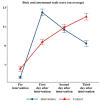The effect of artificial saliva on the control of dry mouth: a semi-experimental study on COVID-19 patients under Non-invasive mechanical ventilation
- PMID: 38822326
- PMCID: PMC11140887
- DOI: 10.1186/s12903-024-04386-4
The effect of artificial saliva on the control of dry mouth: a semi-experimental study on COVID-19 patients under Non-invasive mechanical ventilation
Abstract
Objectives: Since maintaining oral hygiene is essential in nursing care, the present study was conducted to determine the effect of oral care using Mucosamin artificial saliva spray to control dry mouth in ICU patients with COVID-19.
Materials and methods: The current semi-experimental research was conducted on eighty patients with COVID-19 selected using the available sampling method. The study tool was a Beck oral assessment scale (BOAS). The case and control groups were selected from two hospitals with relatively similar conditions and treatment procedures. For patients in the intervention group, mucosamin artificial saliva spray was used in addition to the common care, while control group patients received only common care.
Results: Eighty patients were randomly assigned to two groups named control and intervention (40 patients in each group). The intervention was very effective in reducing the BOAS score after four days in comparison with the control group (9.23 vs. 12.05, respectively; p-value < 0.001). Based on the adjusted model, the application of artificial saliva reduced the BOAS score, indicating improvement in mouth dryness. While the BOAS score was increased in the control group, it had a declining trend in the intervention one.
Conclusion: The study's results showed that using artificial saliva spray could effectively reduce the symptoms of dry mouth in patients with COVID-19 treated with non-invasive mechanical ventilation.
Clinical relevance: The present study introduced an applicable solution (artificial saliva) to treat mouth dryness in ICU patients under mechanical ventilation.
Keywords: Artificial saliva; COVID-19; ICU patients; Non-invasive mechanical ventilation.
© 2024. The Author(s).
Conflict of interest statement
None of the authors have a conflict of interest to disclose.
Figures
References
-
- Fathi Y, Hoseini EG, Atoof F, Mottaghi R. Xerostomia (dry mouth) in patients with COVID-19: a case series. Future Virol. 2021;16(5):315–9. doi: 10.2217/fvl-2020-0334. - DOI
Publication types
MeSH terms
Substances
LinkOut - more resources
Full Text Sources
Medical




